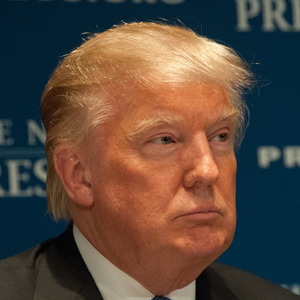Lawyers for Trump University plaintiffs reveal how they got the case and why they're forgoing a fee

Photo of President-elect Donald Trump from Albert H. Teich / Shutterstock.com.
The small San Diego plaintiffs’ firm behind the Trump University lawsuit wasn’t expecting to end up enmeshed in presidential politics.
But that’s what happened when Zeldes Haeggquist & Eck agreed in 2010 to represent a dissatisfied Trump University student, the San Diego Union-Tribune reported. The newspaper profiled the firm and its case from beginning to end, including the reasons the firm had for forgoing the large contingency fee it was eligible for from the $25 million settlement.
The firm took a call in January of 2010 from former student Tarla Makaeff, who became the first lead plaintiff in the case. There happened to be a Trump University seminar happening in San Diego shortly afterward, so attorney Helen Zeldes attended.
What she discovered, she told the newspaper, was a heartbreaking “dog and pony show” designed to sell more seminars at high prices. Nearly 400 people called their firm or Robbins Geller Rudman & Dowd, a larger firm brought on as co-counsel, with stories about being encouraged to max out credit cards or take from retirement savings to pay for the courses. After the case was filed, plaintiffs’ attorneys began to hear from former Trump University employees, who described hard-sell tactics, including keeping the room slightly cold and stationing employees at doors so students would be unable to leave without talking to someone. The plaintiffs would later file a separate class-action case alleging racketeering by Trump University.
Early on, Donald Trump countersued Makaeff for defamation. That claim failed at the San Francisco-based 9th U.S. Circuit Court of Appeals, but it set the stage for Trump’s aggressive defense. When Trump was deposed in 2012, Robbins Geller partner Rachel Jensen said he was combative, threatening to sue her and her firm. The defense argued that students didn’t put in the required effort to take advantage of their Trump University educations, and also suffered from the real estate market’s late-2000s downturn.
Trump’s rise in the election polls didn’t change much about the lawsuit itself, other than scheduling problems, attorneys told the newspaper. But it made the case a household name, especially after Florida Sen. Marco Rubio, a Republican rival for the nomination, mentioned it during the debate. Defense attorney Daniel Petrocelli, a partner and chair of the trial practice committee at O’Melveny & Myers, called the case “a political football” and said the press had been overwhelmingly biased in its coverage.
Trump himself fanned the embers of that story by attacking the judge, U.S. District Judge Gonzalo Curiel of the Southern District of California, as biased because he is “Mexican.” Curiel is an American of Mexican descent.
But candidate Trump became more pleasant to deal with as time went on. Later depositions in late 2015 and early 2016 were smoother, with Trump giving answers that seemed genuine to Robbins Geller partner Jason Forge.
Under the circumstances, both sides thought the case would end in trial. But after Trump was elected, Curiel encouraged the parties to come to a settlement through mediation. District judge Jeffrey Miller mediated a settlement conference that allowed them to avoid the headache of picking a jury with no preconceptions about the president-elect or calling a sitting president to the witness stand. It also avoided lengthy appeals, which seemed likely under the circumstances.
The settlement will ultimately give the class members in the two cases a bit more than half of what each of them spent on Trump University classes. It would be less, but attorneys at Zeldes Haeggquist and Robbins Geller decided to forgo their contingency fee so that plaintiffs could recover more and that there would be no protracted fee-related proceedings to linger in the news.
“The decision came from the very top of our firm. It was not a demand made,” Jensen told the Union-Tribune. “To make sure as a class they can recover the maximum amount, make sure our fees did not get in the way of allowing this to settle so our country could move on.”



